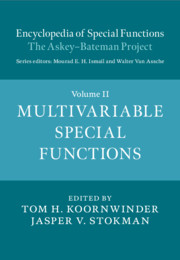Book contents
- Frontmatter
- Contents
- List of Contributors
- Preface
- 1 General Overview of Multivariable Special Functions
- 2 Orthogonal Polynomials of Several Variables
- 3 Appell and Lauricella Hypergeometric Functions
- 4 A-Hypergeometric Functions
- 5 Hypergeometric and Basic Hypergeometric Series and Integrals Associated with Root Systems
- 6 Elliptic Hypergeometric Functions Associated with Root Systems
- 7 Dunkl Operators and Related Special Functions
- 8 Jacobi Polynomials and Hypergeometric Functions Associated with Root Systems
- 9 Macdonald–Koornwinder Polynomials
- 10 Combinatorial Aspects of Macdonald and Related Polynomials
- 11 Knizhnik–Zamolodchikov-Type Equations, Selberg Integrals and Related Special Functions
- 12 9 j-Coefficients and Higher
- Index
7 - Dunkl Operators and Related Special Functions
Published online by Cambridge University Press: 30 September 2020
- Frontmatter
- Contents
- List of Contributors
- Preface
- 1 General Overview of Multivariable Special Functions
- 2 Orthogonal Polynomials of Several Variables
- 3 Appell and Lauricella Hypergeometric Functions
- 4 A-Hypergeometric Functions
- 5 Hypergeometric and Basic Hypergeometric Series and Integrals Associated with Root Systems
- 6 Elliptic Hypergeometric Functions Associated with Root Systems
- 7 Dunkl Operators and Related Special Functions
- 8 Jacobi Polynomials and Hypergeometric Functions Associated with Root Systems
- 9 Macdonald–Koornwinder Polynomials
- 10 Combinatorial Aspects of Macdonald and Related Polynomials
- 11 Knizhnik–Zamolodchikov-Type Equations, Selberg Integrals and Related Special Functions
- 12 9 j-Coefficients and Higher
- Index
Summary
By introducing weight functions on Euclidean space which are products of powers of linear functions vanishing on the mirrors of a finite reflection group one can construct generalizations of classical harmonic and Fourier analysis. There is a commutative algebra of differential-difference operators (the Dunkl operators) which generalize the partial derivatives and which are equipped with parameters. This chapter gives an introduction to the requisite properties of finite reflection (Coxeter) groups, which are associated to root systems. This is followed by the construction and commutativity proofs for the Dunkl operators. By their use one defines a concept of harmonic polynomials which serve as orthogonal bases for functions on the surface of the standard unit sphere with respect to the group-invariant weight function. There is an analog of the exponential function, the Dunkl kernel, which is used to define a generalized Fourier transform. The one-variable version of the transform is related to the classical Hankel transform. The two-dimensional examples of harmonic polynomials include the Gegenbauer and Jacobi polynomials. The general theory includes a natural extension of the classical orthogonal polynomials and of the Bessel functions.
Keywords
Information
- Type
- Chapter
- Information
- Encyclopedia of Special Functions: The Askey-Bateman Project , pp. 187 - 216Publisher: Cambridge University PressPrint publication year: 2020
